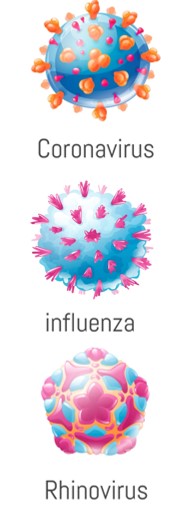French And Vietnamese Study Finds That Co-Infections Involving SARS-CoV-2 And Human Rhinovirus Typically Results In Severe Health Outcomes!
Source: SARS-CoV-2-Rhinovirus-Co-Infections Dec 24, 2021 4 years, 1 month, 1 week, 1 day, 2 hours, 47 minutes ago
SARS-CoV-2-Rhinovirus-Co-Infections: A new study involving researchers from the Institut Hospitalo-Universitaire Méditerranée Infection-France, Thai Binh University of Medicine and Pharmacy-Vietnam and Aix Marseille University-France has discovered that co-infections involving the SARS-CoV-2 coronavirus and the human Rhinovirus typically results in severe health outcomes!

The study findings are important as many countries in are in the winter season and are also facing common cold coronaviruses, influenza and rhinovirus infections besides the SARS-CoV-2 onslaught.
Please do not ignore this appeal for help! Please have a heart this Christmas and help us to sustain this website and also all our research and community initiatives. https://www.thailandmedical.news/p/sponsorship
The study aimed to compare the clinical severity in patients who were coinfected with severe acute respiratory syndrome coronavirus 2 (SARS-CoV-2) and rhinovirus or mono-infected with a single one of these viruses.
The
SARS-CoV-2-Rhinovirus-Co-Infections study period ranged from 1 March 2020 to 28 February 2021 (one year). SARS-CoV-2 and other respiratory viruses were identified by real-time reverse-transcription-PCR as part of the routine work at Marseille University hospitals. Bacterial and fungal infections were detected by standard methods. Clinical data were retrospectively collected from medical files. The study was approved by the ethical committee of the institute.
A total of 6034/15,157 (40%) tested patients were positive for at least one respiratory virus. Ninety-three (4.3%) SARS-CoV-2-infected patients were coinfected with another respiratory virus, with rhinovirus being the most frequent (62/93, 67%). Patients coinfected with SARS-CoV-2 and rhinovirus were significantly more likely to report a cough than those with SARS-CoV-2 mono-infection (62% vs. 31%; p = 0.0008). In addition, they were also significantly more likely to report dyspnea than patients with rhinovirus mono-infection (45% vs. 36%; p = 0.02). They were also more likely to be transferred to an intensive care unit and to die than patients with rhinovirus mono-infection (16% vs. 5% and 7% vs. 2%, respectively) but these differences were not statistically significant.
The study findings showed a higher risk of increased clinical severity in SARS-CoV-2-positive patients coinfected with rhinovirus.
The study team proposed more additional detailed large-scale studies of the co-incidence and interactions of SARS-CoV-2 and other respiratory viruses.
The study findings were published in the peer reviewed journal: Viruses
https://www.mdpi.com/1999-4915/13/12/2528
The SARS-CoV-2 coronavirus first emerged in France at the end of January 2020. Since then, SARS-CoV-2 has infected over 8.76 million French citizens and caused over 122,000 deaths.
/>
Scientists have previously observed that the frequency of co-infection with different respiratory viruses was dependent on the season and sampling time of the study.
Previous studies involving viral co-infections have also reported essential differences in patient outcomes with reference to the time period and the region of the world where the study took place.
Geography has been particularly important, as the occurrence of viral co-infections required a co-incidence of the viral epidemic periods.
Interestingly, significant differences have been observed according to the epidemic mode of the respiratory viruses involved in co-infections. This includes whether or not the viruses showed a bell-shaped incidence curve or circulated throughout the year with varying intensities.

The study team focused on co-infections with SARS-CoV-2 and human rhinovirus (HRV), as HRV was the most frequently associated co-infection with SARS-CoV-2 that was detected in as many as 41% of patients at Marseille University.
The study team compared clinical severity in patients coinfected with a SARS-CoV-2 and HRV against those infected only with one of either virus.
Significantly, a higher number of SARS-CoV-2 co-infections with HRV has been consistently observed in multiple previous studies conducted in various settings and geographical areas.
However, the clinical outcome of these cases with SARS-CoV-2 and HRV co-infection remains unknown.
The study team used the reverse-transcriptase polymerase chain reaction (RT-PCR) assay to detect SARS-CoV-2 and other respiratory viruses from nasopharyngeal samples as part of the routine work at Marseille University hospitals. In addition, bacterial and fungal infections were also detected using standard laboratory tests.
Detailed relevant clinical data was retrospectively collected from medical files. Taken together, a total of 15,157 patients were included in the study, of which 40% (6,034) tested positive for at least one respiratory virus. Furthermore, 93 patients (4.3%) infected with SARS-CoV-2 were coinfected with another respiratory virus, with 67% of these patients (62) testing positive for HRV.
The study findings showed that patients coinfected with SARS-CoV-2 and HRV were significantly more likely to report a cough than those with only a SARS-CoV-2 infection. These patients were also significantly more likely to report breathing discomfort as compared to patients with rhinovirus mono-infection.
Importantly it was found that patients with both SARS-CoV-2 and HRV infections were also more likely to experience severe infection, get transferred to an intensive care unit, and die as compared to patients with only rhinovirus infection.
The study findings highlight that patients with SARS-CoV-2 and HRV co-infections were more likely to have severe consequences as compared to those with either one of the infections. HRV infection was also one of the most common respiratory infections affecting people in the study period. Larger studies are needed to investigate the co-incidence and interactions of SARS-CoV-2 and other respiratory viruses, as well as their impact on public health.
Please do not ignore this appeal for help! Please have a heart this Christmas and help us to sustain this website and also all our research and community initiatives. https://www.thailandmedical.news/p/sponsorship
WISHING ALL OUR READERS A MERRY CHRISTMAS AND A HAPPY AND SAFE NEW YEAR 2022
For more about SARS-CoV-2-Rhinovirus-Co-Infections, keep on logging to Thailand Medical News.

